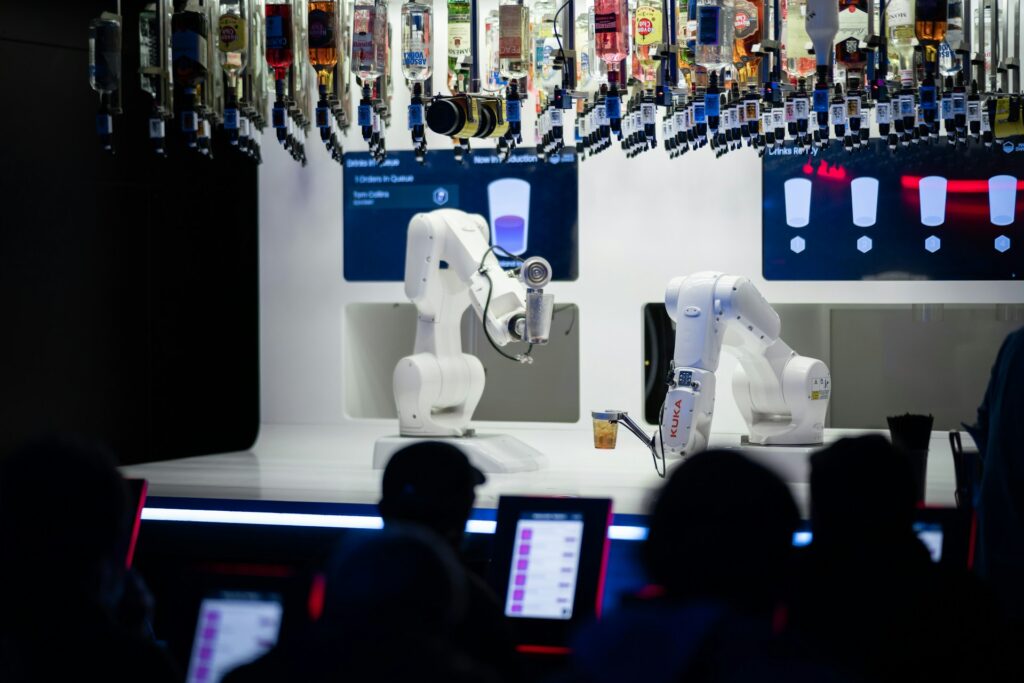The way we work is undergoing one of the most profound transformations in decades, driven largely by advancements in Artificial Intelligence (AI). In 2025, AI is no longer a futuristic concept—it’s a practical and integral part of workplaces worldwide, reshaping tasks, roles, and business models. This article explores how AI is influencing the future of work, the opportunities it creates, and what employees and employers can expect moving forward.

Artificial Intelligence’s Role in Automating Routine Tasks
One of the most immediate impacts of Artificial Intelligence in the workplace is automation. Tasks that once required significant manual effort—such as data entry, scheduling, and basic customer service—are increasingly handled by AI-powered systems. Automation frees employees from repetitive chores, allowing them to focus on higher-value and more creative activities.
For example, AI chatbots now manage large volumes of customer queries in real time, providing quick responses and escalating complex issues to human agents when necessary. Similarly, intelligent scheduling assistants can arrange meetings based on participants’ availability, preferences, and priorities without human intervention.
This shift toward automation doesn’t mean jobs are disappearing; rather, many roles are evolving to emphasize skills that Artificial Intelligence cannot easily replicate, such as critical thinking, emotional intelligence, and complex problem-solving.
Enhancing Decision-Making with Artificial Intelligence Analytics
Another key contribution of AI to the workplace is its ability to analyze vast amounts of data quickly and accurately. Businesses leverage AI-driven analytics to gain insights that support strategic decisions.
For instance, sales teams use AI to predict customer behavior and tailor their approaches, while supply chain managers rely on AI to optimize inventory levels and reduce waste. In human resources, AI tools analyze employee performance metrics and feedback to identify areas for growth and improve retention strategies.
By turning data into actionable insights, AI empowers decision-makers to act with greater confidence and agility.
Artificial Intelligence Powered Collaboration and Communication Tools
Remote and hybrid work environments have become the norm in 2025, and AI plays a vital role in keeping teams connected and productive. Platforms enhanced with AI capabilities assist in streamlining communication and collaboration.
Tools like AI transcription services convert spoken meetings into searchable text, enabling team members to review and reference discussions easily. AI-driven project management software can prioritize tasks based on deadlines and dependencies, helping teams stay aligned on goals.
These technologies not only improve efficiency but also foster inclusivity by providing real-time translation and accessibility features.
Upskilling and Reskilling: Preparing the Workforce for Artificial Intelligence Integration
As AI tools become more prevalent, there is a growing emphasis on upskilling and reskilling workers to ensure they can work effectively alongside AI systems. Employers are investing in training programs that focus on digital literacy, data analysis, and AI fundamentals.
For employees, this shift offers opportunities to expand their skill sets and move into emerging roles that blend human creativity with AI capabilities. For example, AI trainers and supervisors are becoming essential, overseeing the quality and ethical use of AI models.
Lifelong learning is no longer optional but a necessity in a workplace increasingly augmented by AI.
Addressing Ethical and Practical Challenges
While AI offers many benefits, it also raises important ethical and practical considerations. Issues such as data privacy, algorithmic bias, and job displacement are central to ongoing discussions about AI in the workplace.
Companies adopting AI need to implement transparent policies and ethical guidelines to ensure that AI applications are fair and respect employee rights. Additionally, balancing automation with human oversight remains critical to maintaining trust and accountability.
Awareness and proactive management of these challenges will shape the long-term success of AI integration in work environments.
The Future of Work: Collaboration Between Humans and AI
Looking ahead, the future of work is one of collaboration between humans and AI. Rather than replacing human workers, AI acts as an augmenting force—amplifying human strengths while handling routine or data-intensive tasks.
This hybrid model encourages innovation and adaptability, with AI providing insights and automation, and humans applying judgment, empathy, and creativity.
Organizations that embrace this partnership are poised to thrive in an increasingly competitive and fast-paced business landscape.
Conclusion
AI’s impact on the future of work in 2025 is vast and multifaceted. From automating mundane tasks and enhancing decision-making to fostering collaboration and necessitating new skills, AI is reshaping how, where, and why we work.
For employees and employers alike, the path forward involves embracing change, investing in skills development, and maintaining a focus on ethical use. Those who do will find AI to be a powerful ally in navigating the evolving world of work.


Leave a Reply